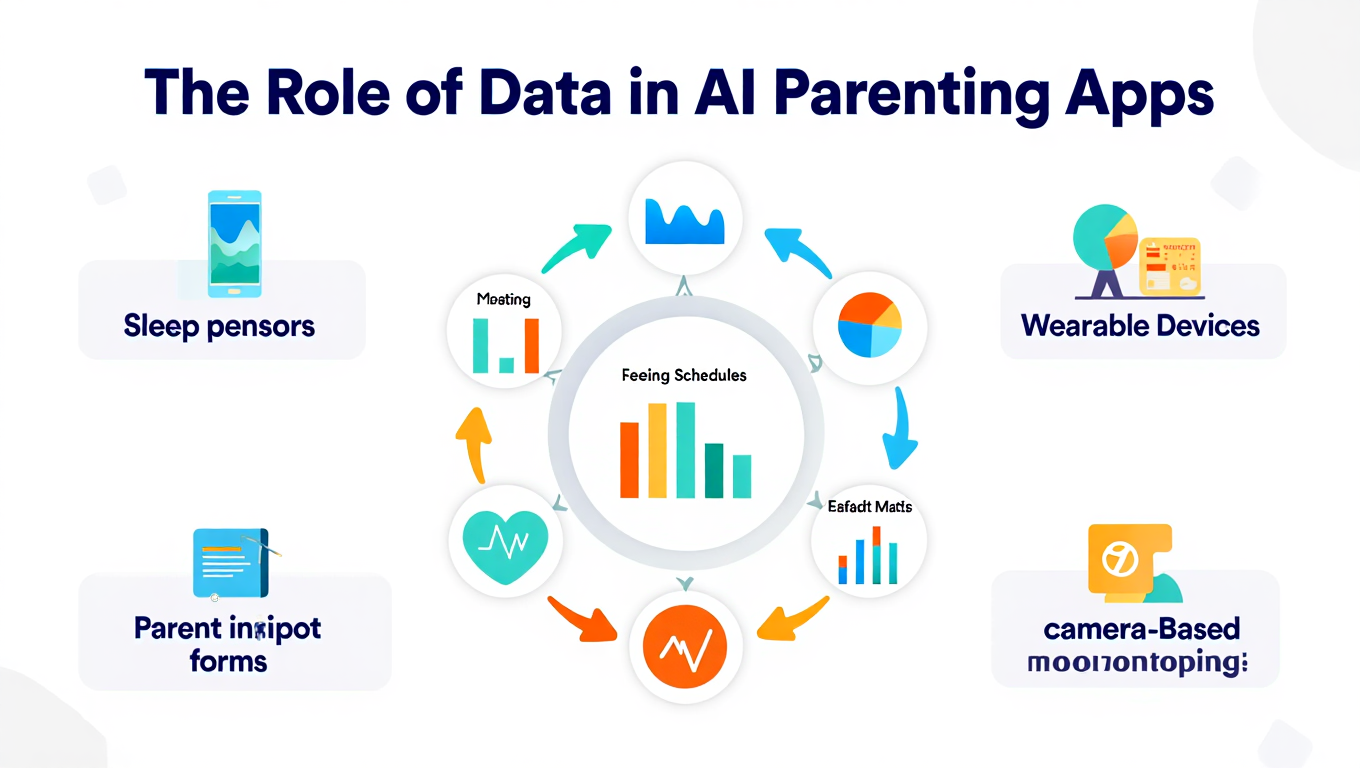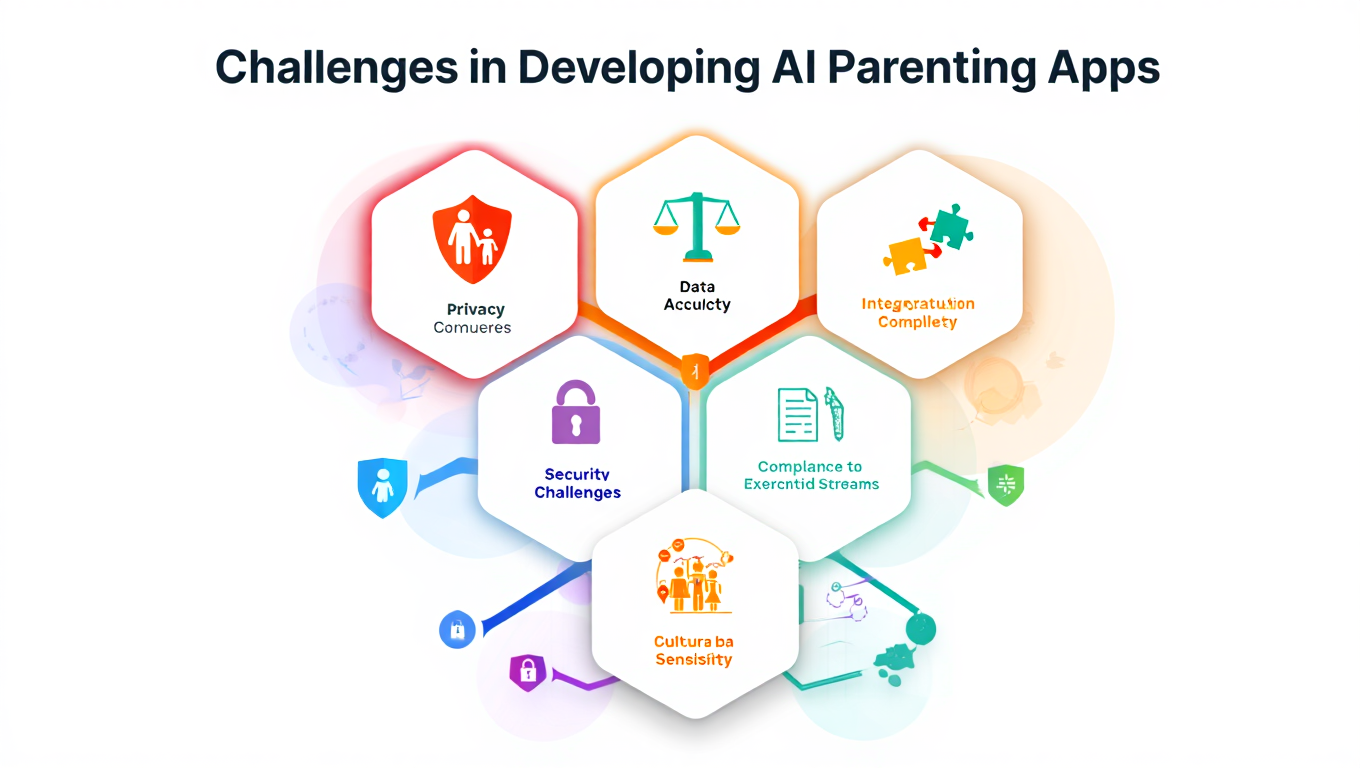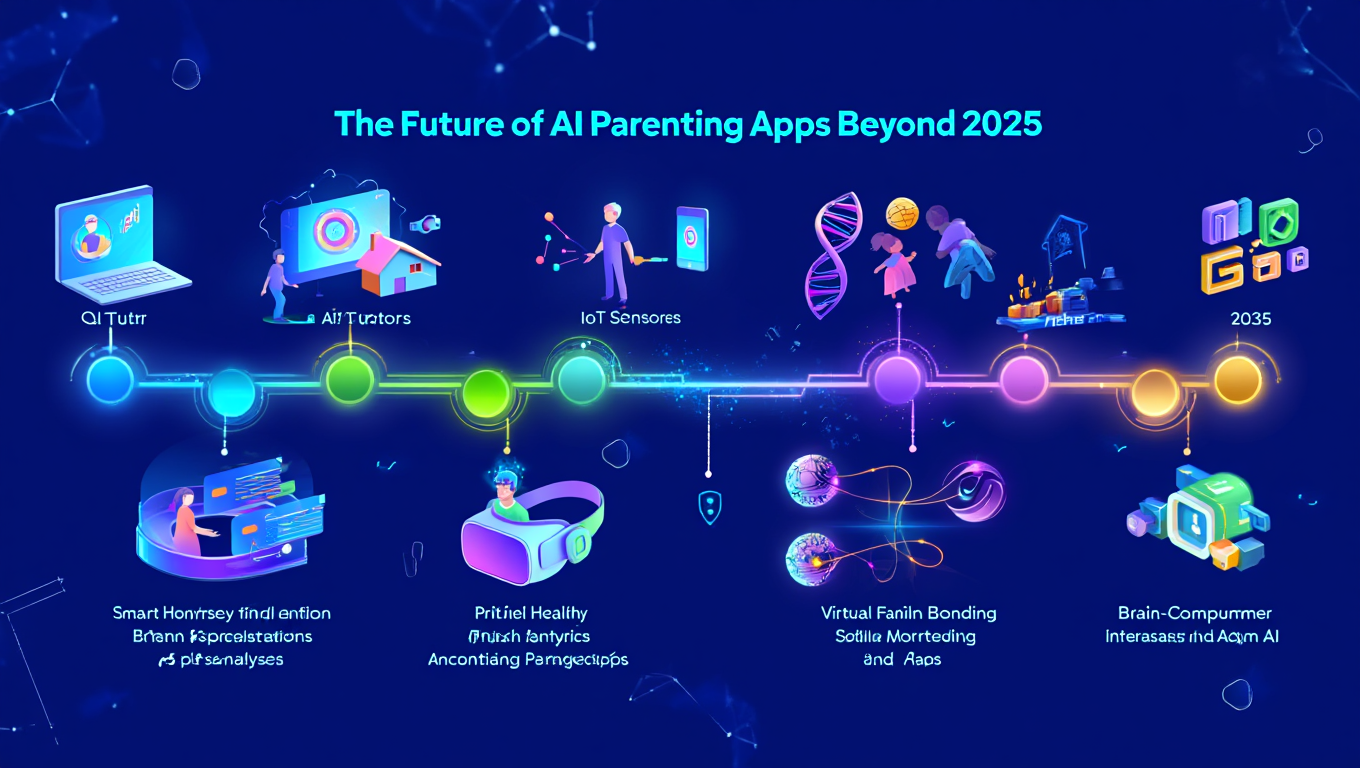
Parenting has always been one of the most rewarding yet challenging responsibilities. With changing lifestyles, increasing work demands, and the rapid integration of technology into everyday life, parents in 2025 face more complex challenges than ever before. From managing screen time to ensuring safety in the digital space, raising children now requires a balance between traditional parenting values and modern technological tools. This is where AI parenting apps have emerged as a groundbreaking solution.
Table of Content
The year 2025 marks a significant turning point in the parenting-tech industry. Artificial Intelligence (AI) has matured from being a buzzword into a practical, everyday companion for millions of parents worldwide. With advanced AI capabilities such as natural language processing, predictive analytics, and emotion recognition, parenting apps are no longer just about reminders or simple monitoring; they now act as personalized parenting assistants.
One of the biggest reasons AI parenting apps are gaining popularity is their ability to adapt to individual families. Unlike generic parenting advice, these apps analyze a child’s behavior, learning patterns, and emotional cues, and provide tailored guidance for parents. For example, if a child struggles with sleep routines, the AI can recommend bedtime adjustments based on scientific data and the child’s past patterns.
In addition, the global pandemic of the early 2020s changed how parents approached digital tools. More families became open to using technology to balance work, education, and family life. In 2025, this openness has translated into mainstream acceptance of AI-driven parenting solutions.
Simply put, AI parenting apps have become more than just digital tools; they are companions for parents navigating the complexities of modern child-rearing.

An AI parenting app is a mobile or web-based application that uses artificial intelligence to assist parents in raising their children. Unlike traditional parenting apps, which rely on manual inputs and static tips, AI-powered apps leverage machine learning, predictive analytics, and big data to deliver personalized insights.
These apps act as smart digital assistants designed specifically for parents. They analyze a child’s habits, development milestones, and daily activities to provide customized recommendations. For instance, the app can suggest educational games based on a child’s age, recommend dietary adjustments, or even monitor emotional well-being through sentiment analysis.
Some of the core functions of an AI parenting app include:
What sets these apps apart in 2025 is their integration with smart devices and wearables. Many apps now connect with baby monitors, smartwatches, and home assistants to provide real-time updates. For example, if a child’s smartwatch detects unusual heart activity, the app can immediately alert parents and even suggest medical attention.
Ultimately, AI parenting apps are designed to bridge the gap between parental instincts and technological support, making parenting less overwhelming and more informed.
Parenting in the 21st century has evolved into a multifaceted challenge. While previous generations mainly focused on physical safety and education, today’s parents must also navigate digital safety, emotional well-being, and balanced development. The modern child is growing up in an environment where smartphones, social media, and digital education are part of everyday life.
This digital environment creates both opportunities and risks. For example, online learning platforms offer vast educational resources, but excessive screen time can lead to developmental issues. Similarly, social media can connect children with peers but also expose them to cyberbullying.
Here’s where AI parenting apps play a critical role:
In short, AI empowers parents to make informed decisions quickly and confidently. It doesn’t replace parental love and intuition but enhances it with technology-driven insights. In 2025, AI will have become an essential partner in raising emotionally resilient, safe, and healthy children.
The effectiveness of an AI parenting app lies in its features and usability. In 2025, successful apps offer an advanced combination of AI-driven functionalities that help parents manage daily parenting challenges. Let’s look at some core features every effective AI parenting app must include:
Apps track children’s digital activity, sleep cycles, and daily routines using data from connected devices. For instance, they can monitor screen time and alert parents if usage exceeds healthy limits.
AI learns from the child’s history and behavior patterns to offer targeted advice. A toddler who shows signs of delayed speech may trigger language development tips and activities.
Growth charts, emotional milestones, and cognitive skills are tracked and compared against standard benchmarks. This ensures that parents are aware of potential developmental delays early on.
Modern apps are equipped with real-time location tracking, online activity monitoring, and cybersecurity alerts. Some even integrate with AI chat filters to detect harmful online conversations.
Instead of generic reminders, apps now send intelligent alerts. For example, if a child’s sleeping pattern is disrupted for three consecutive nights, the app might recommend adjusting meal times or bedtime routines.
These features combined create an all-in-one parenting companion, helping parents manage safety, education, health, and emotional well-being effectively.
By 2025, AI parenting apps will have advanced significantly, embracing futuristic features that go beyond simple monitoring. These trends are shaping the way parents and children interact with technology:
Voice-enabled AI assistants allow parents to issue voice commands, such as “What’s my child’s screen time today?” or “Suggest a bedtime story.” This hands-free feature is particularly useful for busy parents.
Using facial recognition and voice tone analysis, AI app development can now detect a child’s emotional state. For instance, if a child is feeling anxious, the app might recommend calming activities or notify parents.
AI parenting apps connect seamlessly with smart home devices. For example, the app can dim the lights at bedtime, adjust the room temperature for better sleep, or even play soothing music automatically.
Some apps use wearable data to predict potential health issues like obesity risks, irregular heart activity, or stress levels.
To keep children engaged, apps incorporate gamification, rewarding kids for completing educational tasks or following routines.
These emerging trends highlight how AI is no longer reactive but proactive, making parenting not only more efficient but also more enjoyable.

Choosing the right technology stack is one of the most critical steps in developing an AI parenting app. A strong stack not only ensures smooth functionality but also guarantees scalability, security, and real-time performance. In 2025, developers will have access to advanced frameworks, AI tools, and cloud infrastructures that make building intelligent parenting solutions more efficient than ever.
Artificial intelligence lies at the heart of every parenting app, so selecting the right AI framework is essential. Developers typically use:
These frameworks allow apps to learn from user data, making their recommendations more accurate and personalized over time.
Since AI parenting apps deal with large datasets, cloud solutions are a must for storage, scalability, and security. In 2025, the most popular options include:
Cloud platforms also support real-time synchronization across devices, so parents can seamlessly switch between phones, tablets, or smart home devices without losing data.
An AI parenting app must be available across multiple devices and operating systems to ensure accessibility and inclusivity. Developers often use:
In short, the right tech stack is what transforms an app from a basic parenting tool into a reliable AI-powered assistant.
Developing an AI parenting app requires more than just coding. It’s a step-by-step process that involves research, design, development, and deployment. Let’s break it down:
Every successful app starts with market research. Developers must study parenting needs, identify pain points, and analyze competitors. For example, parents may demand better digital safety features or apps tailored to children with learning disabilities.
Key steps in planning:
Parents need simplicity and usability. A cluttered interface can overwhelm users, especially busy parents. Effective UI/UX design should include:
This is the most technical stage. Developers train AI models on datasets involving child development, behavioral patterns, and emotional recognition. The models should:
Testing ensures reliability. This includes:
Finally, deployment involves publishing the app on Google Play Store, Apple App Store, and web platforms. Regular updates are then required to improve AI accuracy and add new features.

Data is the lifeblood of AI parenting apps. Without data, AI cannot provide personalized insights or predictive recommendations. However, working with sensitive child data requires responsibility, transparency, and compliance with strict regulations.
AI parenting apps collect data through:
This data helps AI personalize recommendations, but only when collected ethically.
Since parenting apps deal with children’s personal data, ethics are crucial. Developers must:
Transparency is key; parents must know exactly how their data is being used.
To operate legally in global markets, apps must follow strict data protection laws:
Non-compliance can result in heavy fines and loss of user trust. Therefore, ethical data handling is not just a legal requirement; it’s a trust-building strategy.
Building a parenting app requires significant investment in research, AI development, and compliance, so a strong monetization strategy is crucial. In 2025, most AI parenting apps will rely on a mix of models to sustain revenue while keeping services accessible.
The most common model is monthly or yearly subscriptions. Parents pay for premium features such as:
Subscription models work well because parents value ongoing support and are willing to pay for consistent, reliable guidance.
Freemium apps offer basic features for free, such as daily parenting tips, growth trackers, or screen-time monitoring. Parents who want more advanced functions, like real-time emotion tracking or AI-driven learning recommendations, must upgrade to premium.
This model helps attract a large user base quickly and then convert a percentage of them into paying customers.
Some apps add extra paid services within the app, such as:
In-app purchases allow flexibility for parents who don’t want long-term subscriptions but are willing to pay for occasional premium features.

Despite their growing popularity, AI parenting apps face several serious challenges that developers and businesses must overcome to gain user trust.
Since these apps handle children’s personal data, parents are naturally concerned about security and misuse. Any data breach could lead to loss of trust and legal repercussions. Developers must use end-to-end encryption, anonymization, and transparent policies to reassure parents.
AI isn’t perfect; it relies on available datasets. If the training data doesn’t cover diverse populations, the AI might misinterpret behaviors. For instance, cultural differences in parenting styles could lead to inaccurate recommendations. Developers must constantly retrain AI models with broader, more diverse datasets.
Many parents are still skeptical about allowing AI to play a role in parenting. They may fear over-reliance on technology or worry that AI could replace human instincts. To overcome this, apps must focus on supporting, not replacing, parents, and communicate this message clearly in their branding.
One of the biggest selling points of AI parenting apps is their ability to enhance child safety, both online and offline.
Children today spend hours online, often unsupervised. AI apps can:
With GPS-enabled devices, parents can track their child’s real-time location. Features include:
AI parenting apps also defend against digital threats by:
By combining monitoring with proactive safety features, AI apps give parents peace of mind while empowering children to explore safely.

AI parenting apps are not just tools for today, they are shaping the future of parenting technology. By 2030, we can expect even more advanced features.
AI will evolve to provide long-term predictions. For example, analyzing a child’s habits to forecast potential academic strengths or health risks. This proactive approach helps parents prepare better for the future.
Future apps will connect directly with pediatricians, therapists, and schools. This allows seamless sharing of health records, making check-ups and interventions more efficient.
AI parenting apps will likely merge with educational platforms, providing personalized learning paths. Instead of generic lessons, children will get AI-designed curricula based on strengths, weaknesses, and interests.
This integration will transform parenting apps from safety tools into holistic child development platforms.
Developing a robust AI parenting app involves significant costs, depending on the complexity, features, and platform.
On average, developing a full-featured AI parenting app in 2025 costs between $10,000 – $250,000. Simple apps with limited features may cost less, while large-scale apps with AI, cloud integration, and healthcare connectivity could exceed $500,000.
AI parenting apps are not about replacing parental instincts but about enhancing them with data-driven insights. In 2025, these apps will have evolved into smart companions that help parents manage safety, development, and emotional well-being more effectively. The key takeaway? AI can never replace love, intuition, or human connection. But when paired with technology, parents are better equipped to raise happy, healthy, and safe children in today’s digital-first world. The future of parenting is human + AI, working hand in hand to create a nurturing environment where children can thrive.
